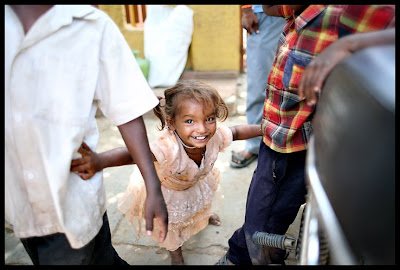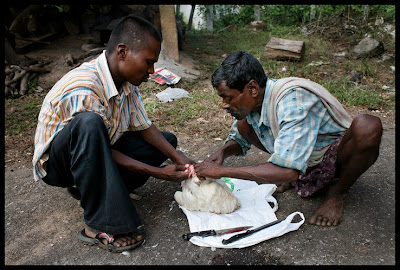
5.30.2008
The Dhobi Ghat (cont'd)
(cross-posted to my personal blog)
On Monday we went to the dhobi ghat on Lazar Road. A dhobi ghat is a place where washermen, known as dhobi wallas, wash other people's clothes by hand. Ravichandran, one of the dhobi we spoke to, said that he picks up clothes from the surrounding neighborhood, charging three rupees to wash a shirt or pants, a little more for a blanket or a bed sheet.
In Mumbai, one of the dhobi ghats has hundreds of washing stations, and the fact that it stretches out under a large bridge has made it a bit of a popular tourist stop; visitors often ask the auto drivers to take them to it like an overlook. According to Frommers, “At the very least, it’s a great photo opportunity, though most locals think it rather amusing that their everyday work arouses such curiosity.”
The dhobi ghat on Lazar Road is much smaller, perhaps two dozen stations, not all of them even occupied. It's situated near the train tracks, in a neighborhood full of one-way roads that seem to point outward. It's a fascinating tradition and it's visually (and aurally) interesting. But there's something below the surface of this, something the tourists don't realize as they shoot video off of overpasses: the dhobi wallas are a dying breed.
We spoke to one dhobi walla whose interview we didn't use in the slideshow piece. Now that there are washing machines, he said, people don't give them clothes anymore. People do the small clothes in the washing machine, and mainly give the dhobi blankets, rugs and bigger clothes — the end result being less work.
The impact of this is quietly huge. In Koramangala, a neighborhood that is now a major software hub and Bangalore's self-described "Most Happening Place," a dhobi ghat that existed just a few years ago is now gone. I'm writing this post at a Coffee Day in Koramangala; the mood is chatty, the air, conditioned. Outside the plate-glass windows, the Bangalore Development Authority has erected a commercial park.
These developments are great for the economy; looking outside, the first floor of the BDA complex houses storefronts, their names written in English and Kannada; "Maruthi Stationers," "Vijayanand Travels." Above that there are two floors of offices; none look vacant. I see a man with a plastic shopping bag; an older man, sharply dressed, with cellphone and an attaché; two younger men now with plastic name badges hanging from belt loops. There's bustle here, and bustle is good for business.
But across town, there's Ravichandran. Despite his occasionally broken English, something he said at the end of our interview hints at a growing dillema:
"I want [a] nice job," he said. "But no, I don't know which one. I can't work..." he trailed off. "[This is the] only job I know."
Ravichandran learned the business of the dhobi ghat from his father in the seventies, and in a job that passes from fathers to sons, it's not difficult to imagine that chain going back a century. It's a chain that may be broken in this generation; for his part, Ravichandran never married and has no children — no son to teach to wash the clothes, and fewer clothes to teach a son to wash.
This post was written by me and co-reported with Ranjana Thomas, who stunned me by conducting interviews in English, Hindi, Tamil and Kannada.
5.29.2008
The Dhobi Ghat
In Bangalore, as in many cities across India, dhobi wallas wash garments and pound them dry as they have done for centuries. As the city has grown and modernized, there has been less and less work for the dhobi. The dhobi ghat in the neighborhood of Koramangala closed down in recent years. This dhobi ghat, on Lazar Road, is relatively small. But the dhobi wallas here go on with their work, day after day; for some, it is the only job they know.
It is just past 6 in the morning and the sky is overcast with light clouds. We walk in through a white iron gate into a yard of bright green grass, wooden poles, hanging clothes lines, and several rows of rectangular grey stone water basins. Towards the back of the yard is a large well, 15ft. wide, pumping water into two large square holes. From here, pale blue and yellow tubes feed water into the stone basins that line the yard. The sun has not yet fully risen but the men here seem to have been hard at work for quite some time already---scrubbing, dunking, rinsing, folding, hanging.
Two small dogs immediately begin barking at the strangers they do not recognize. If this is some reflection of the workers sentiments towards us, there is no indication in their reaction to our arrival. Their random glances between rinses remind me that our presence is an oddity, but it almost seems as if we are going unnoticed…or at least ignored. Here there is an air of professionalism.
“Nimah photo theghi boudha?” Courtney asks, ‘Your photo take can I?’ and receives a side-to-side nod of the head. This means yes.
Once the dogs stop barking, the many sounds of the washing place reach an incredible audibility. Set against an otherwise quiet early morning, a constant flow of water into the stone basins sounds more like a slow moving stream than a running water faucet. A scrub brush scratches soap over a bright blue shirt and a slap! slap!slap! follows a distinct tempo as a dhobi beats a yellow towel against the flat stone. Deep blue buckets produce a hollow thumping sound when drops of water first fall into them and every now and then the few garments hanging from the lines can be heard flapping amongst a slow and infrequent breeze. At another tempo, splashes of excess water beads follow the circular pattern of a dhobi’s blanket swing before smacking into the ground while his heavy breathing resembles that of a weight lifter struggling to finish the last of his reps at the gym. Their movements fluid and methodical, the dhobis work in silence leaving me to close my eyes and listen.
I listen and listen until a woman comes through and interrupts with the first native voice I have heard since entering the yard. There is no way to know what she is saying, but her partner in the conversation appears annoyed. I laugh at the thought that perhaps it is a lover’s quarrel then get up and walk to other side of the yard. There is more to see.
Two cows, one black and one brown with white spots are tied to the trees; five sheep lay in their midst still asleep. The sun rises higher; shadows become more pronounced and more piles of clothes line the aisle outside the columns of basins as more men arrive. The majority of the clotheslines remain unused so far, but it is easy to imagine the scene when the washing is finished. It is easy to recognize a technique and a routine in their labor. Organized and thorough, they work fast but not hurriedly. One dhobi drapes a set of trousers over a metal pipe to drip dry---each one folded exactly like the other. He stops to smile and pose in front of them before getting back to work. Another offers tea. “No thanks, I’ll be leaving you to your work soon.”
I sit for a bit longer—seeing, hearing, and thinking. So this is what’s happening in Lingarajapuram, India when on the other side of the world I’ve just finished eating dinner. Yes, I’ll be leaving soon and I shall hope to remember the sights and sounds of this morning.
kiddies
5.27.2008
snaps
5.26.2008
We are connected!





Finally. We have internet in our flat. India is absolutely amazing and continues to blow my mind more and more each day. Here's my loose chronicling of the last weekends trip to Chickmagalur, where we stayed at Preethams estate (thanks again, Preetham!), picked wild avocados, went looking for bison in the middle of the night, saw monkeys jumping from giant palm trees, and drank the best coffee of our lives. It was the absolute best way to nurse jetlag.
More photos, words, etc., to come from all of us!
-Courtney









